When I first visited the Haram Mosque (Masjid Al-Haram) in Mecca, Saudi Arabia in 2003, I was very surprised to see Muslims struggling to kiss the Black Stone (Hajr Al Aswad).
Obviously, they do not worship the Ka’bah when standing for prayer (salat). So, why then do they always push and clamor excitedly in order to just kiss an old stone?
Puzzled, I decided to do a bit of research to find out why this particular Black Stone seems to provoke such a passionate response in the hearts of Muslims.
So, why do the Muslims kiss the Black Stone ( Hajr Al Aswad)? Muslims kiss the Black Stone in the fervent belief that it came from God (Allah) in paradise and because it was the usual custom of the revered Prophet Mohammed (SAW). Also, on the Day of Judgement, they believe that the Black Stone will have two eyes and a tongue to intercede and to speak for those (Muslims) who had touched the stone with sincerity.
As strange as these reasons seem to be, according to Islamic scholars, they are perfectly valid understandings. In three separate authentic hadiths or prophetic sayings, it is recorded that Prophet Mohammed (SAW) himself made these very surprising claims.
It was also witnessed that on circumambulating the Ka’bah, and upon reaching the Black Stone, Prophet Mohammed (SAW) would himself touch the stone with his own hand or with a walking stick.
Then, he would immediately kiss the hand he had touched it with/or kiss the walking stick.
Admiration and Emulating Prophet Mohammed (SAW)
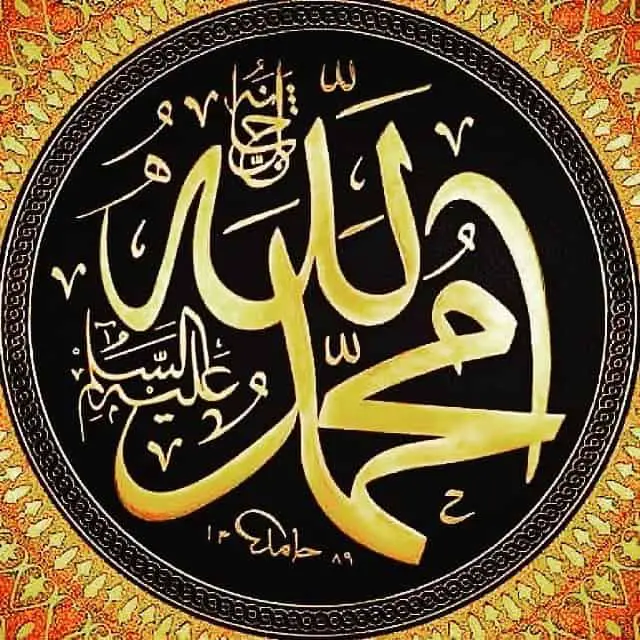
During his lifetime, people around Prophet Mohammed (SAW) loved and admired him because he spoke and acted with great consideration. He knew that they loved him as the Messenger of Allah and for his honest and kind ways.
At that time, Muslims always paid great attention to his words and actions. They did as he ordered them to do and they tried to behave in much the same ways as he (SAW) himself behaved. This is called emulating the Prophet or his Sunnah.
Since that time and until today, Muslims have endeavored to do the same.
The fact that Prophet Mohammed (SAW) claimed the Black Stone was sent to earth by Allah and that it would intercede for Muslims on the Day of Judgement is proof enough for Muslims that there is something very special about it, indeed.
Additionally, the fact that Prophet Mohammed (SAW) touched the stone in a ritualistic fashion reinforces the belief that the Black Stone has a divine origin.
Out of love and respect, Muslims feel motivated to emulate him.
So, when Muslims visit the Haram Mosque in Mecca, they make it a point to try to touch or to kiss the Black Stone (Hajr Aswad) as they circumambulate (tawaf) the Ka’bah.
They do it because Prophet Mohammed (SAW) did so during his own life. (Sunnah)
They do it with the certainty that there is some good in it and that touching or kissing the stone will benefit them not in this life, but ultimately in the hereafter.
What Is The Black Stone, Anyway?
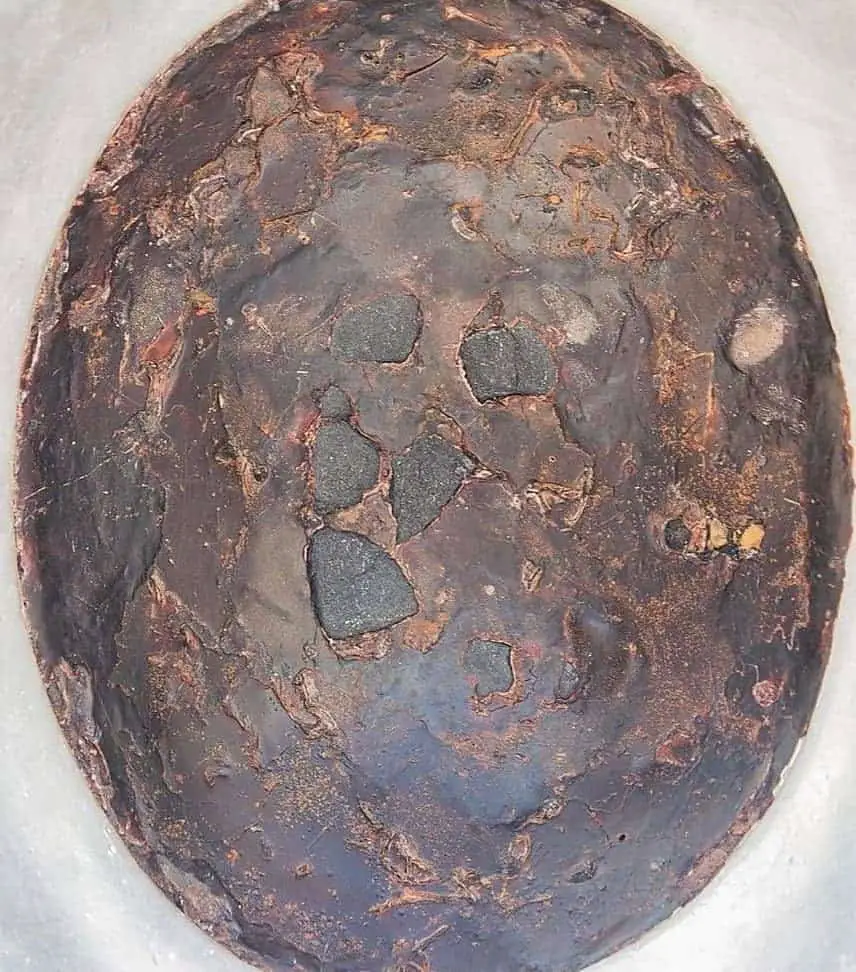
The Black Stone (Hajr Al Aswad) consists of 8 fragmented pieces of small black stones set into an oval silver frame.
It is mounted at head height on the southeast corner (Al Rukn Al Aswad) of the Ka’bah.
The stone marks the location where each circumambulation (tawaf) begins and ends.
It is also directly opposite a high mounted florescent green light that indicates to the pilgrims the departure point for a new circumambulation (tawaf).

As Muslims pass by the stone, they try to kiss or touch it. Normally, however, there are far too many people trying to access it. People excitedly struggle, push and clamor to gain access to the silver frame that holds the stone fragments.
Often times because of the great number of people, it is impossible for most pilgrims to do so.
The Haram Mosque Police Control the Black Stone
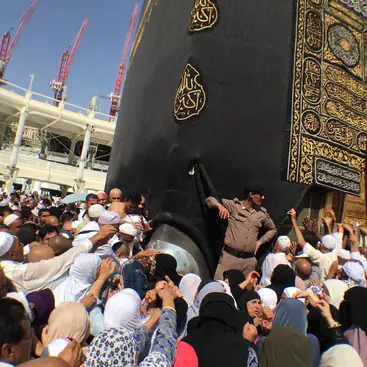
Access to the stone is controlled and managed by the Haram Mosque police. They take it in turns to stand on the Ka’bah wall next to the stone so as to regulate and organize the crowds attempting to kiss it.
They discourage pushing and try to facilitate ease of access for women, old people and children.

Fortunately, most Muslims are content to simply wave or gesture at the Black Stone as they complete one circumambulation (tawaf) and start the next.
They say the words in Arabic, Bismillah Allahu Akbar meaning In the name of Allah, Allah is Great then continue on their way.
The 6 Main Reasons Why Muslims Passionately Want To Touch Or Kiss The Black Stone
| 1. | Allah (SWT) Sent The Black Stone From Heaven To The Earth |
| 2. | The Black Stone Was White At First But Made Black From Sins |
| 3. | The Black Stone Will Intercede For Muslims On Judgement Day |
| 4. | Prophet Mohammed (SAW) Himself Touched the Black Stone |
| 5. | Umar (RA) Saw Prophet Mohammed (SAW) Kiss The Black Stone |
| 6. | Touching or Kissing The Black Stone is An Expiation of Sins |
1. Allah (SWT) Sent The Black Stone From Heaven To The Earth
Abdullah Ibn ‘Abbas (619-20 CE) was Prophet Mohammed’s cousin on his father’s side. He spent his childhood with the Mohammed (SAW), would fetch and carry water for him, pray (salat) and be with Prophet Mohammed during meetings, on long trips and military expeditions.
Very often, Prophet Mohammed (SAW) would keep the young Ibn Abbas close to him, pat him and ask Allah to teach the boy knowledge about the Holy Quran.
Over the years, Ibn Abbas continued to follow his cousin Mohammed (SAW), memorizing the Quran and learning about Islam from him.
When Prophet Mohammed (SAW) died on June 8th, 632 CE, Ibn Abbas was only 13 years of age. After his death, Ibn Abbas voraciously continued to learn about Islam from Prophet Mohammed’s companions (Sahaba).
He also learned and collected many narrations, hadith or prophetic sayings by Prophet Mohammed (SAW). He would consult as many as 30 companions in order to verify just one single piece of information.
Throughout his life, Ibn Abbas was famous for his Islamic knowledge and keen understanding. He became a renowned teacher.
He was a master of the prophetic traditions and could offer a powerful exegesis on the texts of the Holy Quran.
In an authentic sahih hadith, it was narrated that Abdullah Ibn Abbas said this of Prophet Mohammed (SAW):
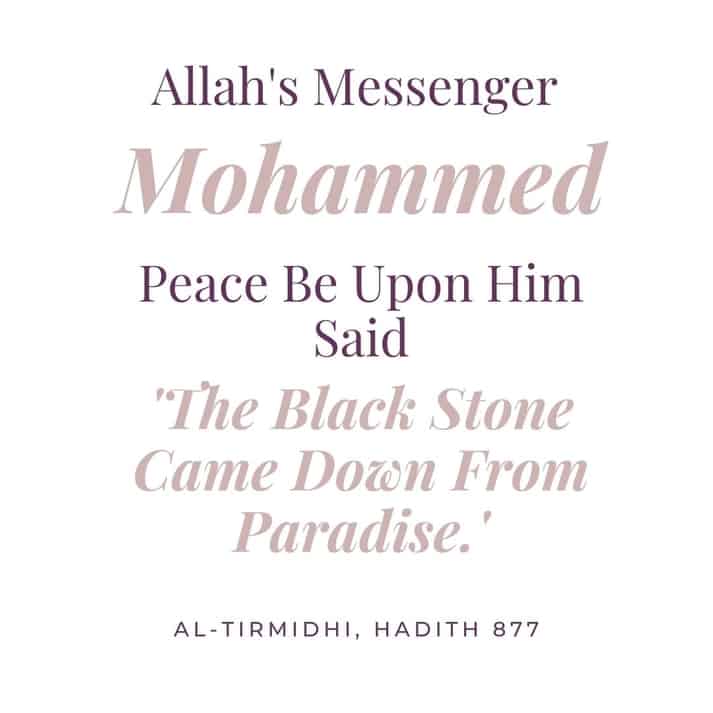
2. The Black Stone Was White At First But Made Black From Sins
In the same authentic hadith, Ibn Abbas had claimed that he heard Prophet Mohammed (SAW) say that:
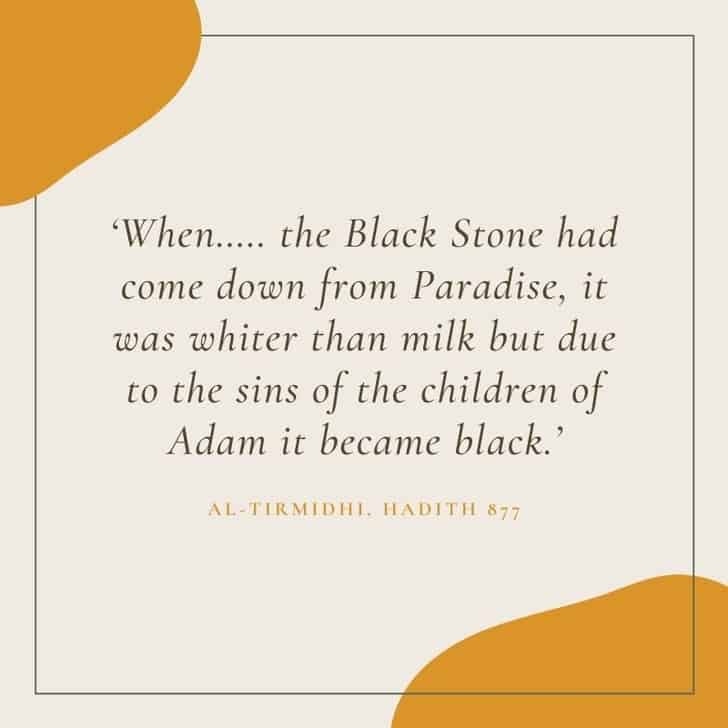
The hadith or saying was classified as authentic sahih by Ibn Kuzaymah and strong (qawi) by Al Haafiz Ibn Hajar
Many Muslim commentators accept the complete veracity of this hadith and even argue that if sins can turn a white stone black, what greater effect would sin have on the human heart.
3. The Black Stone Will Intercede For Muslims On Judgement Day
Abdullah Ibn Al-Abbas is also recorded by Al Tirmidhi and Ibn Maajah as saying:
Allah’s Messenger (Mohammed SAW) said about the Black Stone:
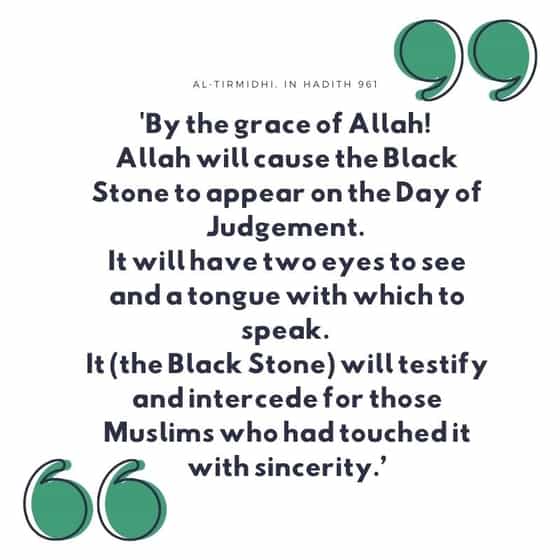
Also, it is strong (qawi) by Al Haafiz Ibn Hajar
Although Muslims do not pray or worship the Black Stone, they have a very strong sense of its religious significance due to this particular hadith.
4. Prophet Mohammed (SAW) Himself Touched the Black Stone
Each time, Prophet Mohammed (SAW) entered Mecca, he would touch the Black Stone before circumambulating the Ka’bah.
One of Prophet Mohammed’s (SAW) companions was Jabir Ibn Abdullah (RA) who fought in 19 military campaigns alongside Prophet Mohammed (SAW).
There are many ahadith attributable to this noble companion (sahaba).
In one narration told by Jabir Ibn Abdullah (RA) who said that:
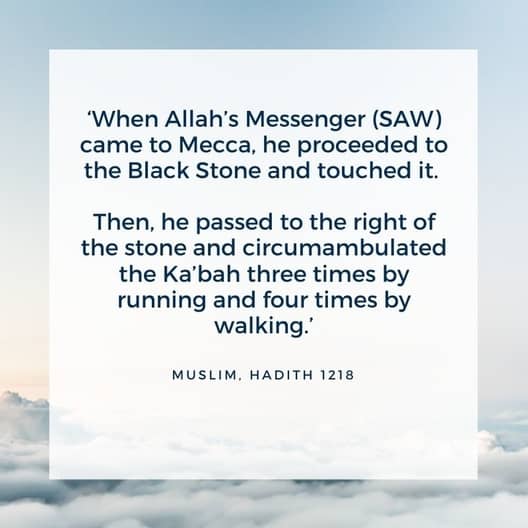
5. Umar (RA) Witnessed Prophet Mohammed (SAW) Kiss The Black Stone
Umar Ibn Al Khattab (RA 584- 644 CE) was a senior companion to Prophet Mohammed (SAW) and after his death became the second caliph of the Rashidun Caliphate.
He was tall, powerful and an athlete. After 610 CE, Umar strongly opposed Prophet Mohammed (SAW) in his teaching Islam and did his utmost to persecute Muslims even intending that the Prophet (SAW) be executed.
After an altercation with his own sister in which he slapped her and after being moved by reading a verse from the Holy Quran, Umar Ibn Al Khattab finally converted to Islam in 616 CE.
In a very famous narration recorded by Al Bukhari and Muslim, Umar (RA) on arriving at the Black Stone and kissing it said to the Black Stone;
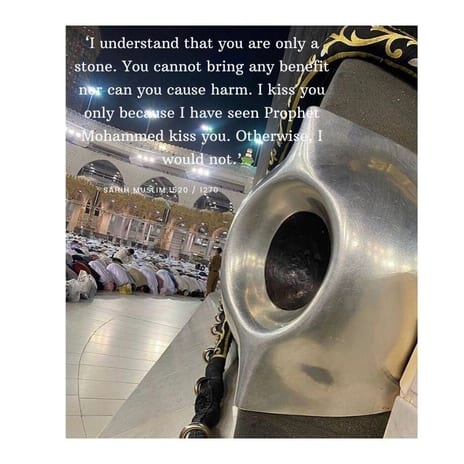
6. Touching or Kissing The Black Stone is An Expiation of Sins
When Muslims manage to jostle their way through the crowds and finally get to kiss or touch the Black Stone, they feel a sense of joy and great achievement.
In a narration told by Ibn Umar who said that he had heard Prophet Mohammed (SAW) say;
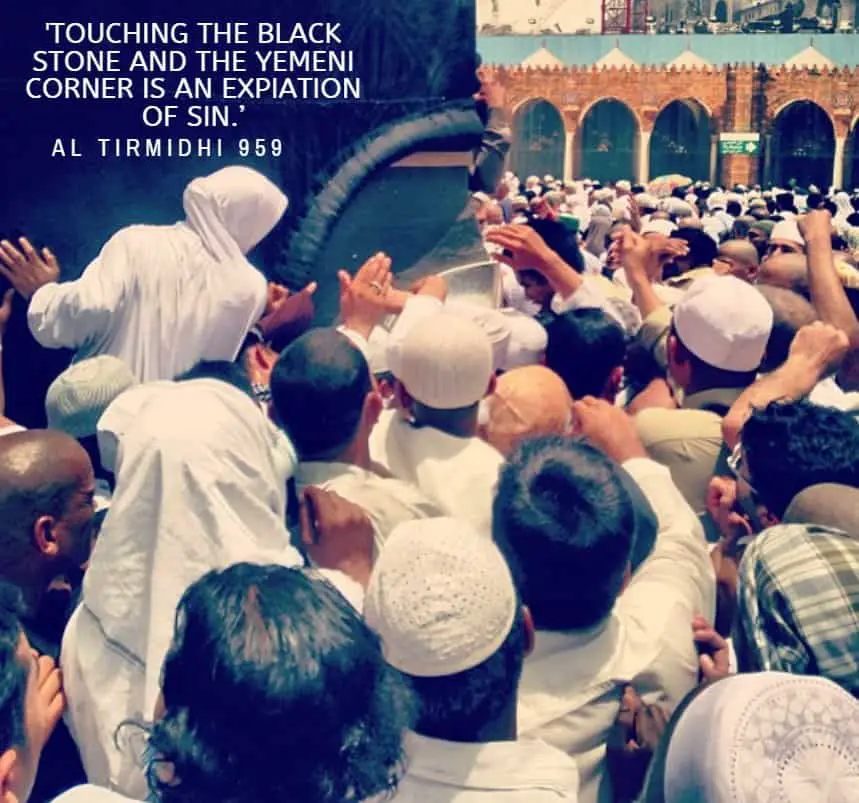
My Black Stone Experience
In 2008, I remember when I and my wife first succeeded to make our way through the crowds to the Rukn Al Aswad corner. It was late afternoon, Asr time.
The weather is usually hot and for this reason, there were fewer people walking about the Ka’bah.
We struggled a little and felt stressed by the pushing and fervent shoving. Finally, with the help of a mosque policeman manning the corner, my wife managed to move forward to kiss the Black Stone quickly followed by myself.
We both felt a great sense of accomplishment and satisfaction. Alhamdulillah!

Related Questions
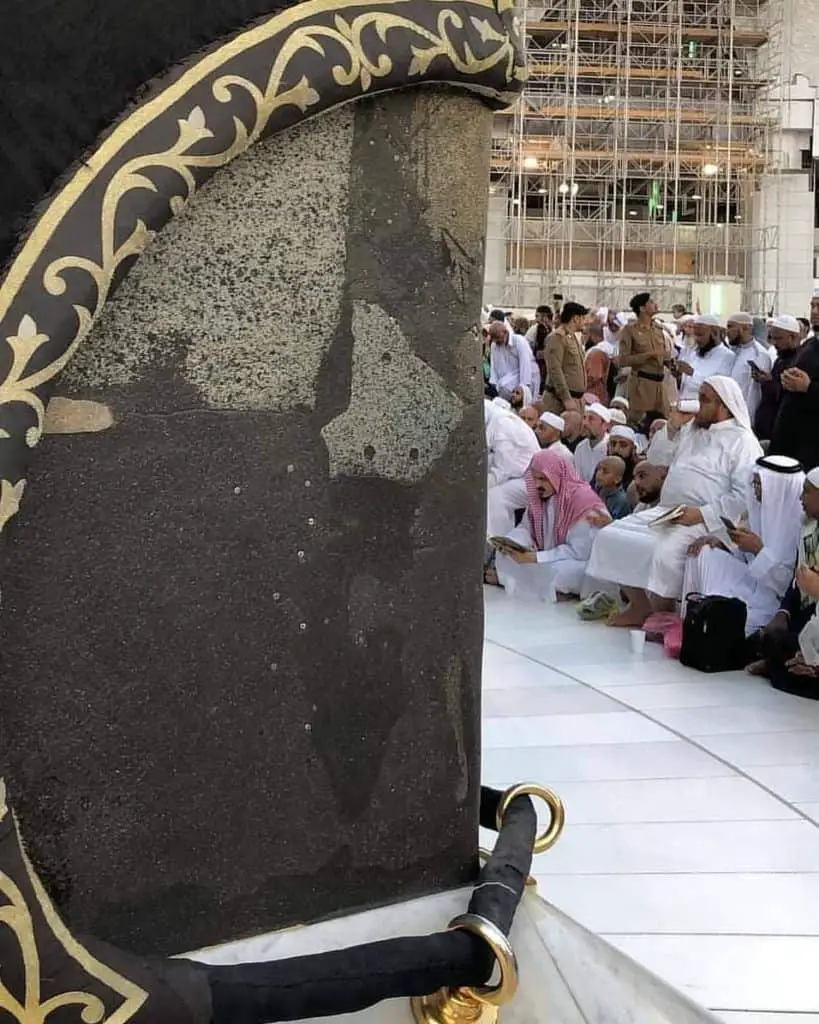
What is the Black Stone Made of? Speculation abounds! It could be volcanic basalt, an agate stone, or possibly a pumice glass because the Black Stone actually floats in water. It may even be a meteorite.
The truth is it has never been scientifically tested. But, we know it is from Allah.
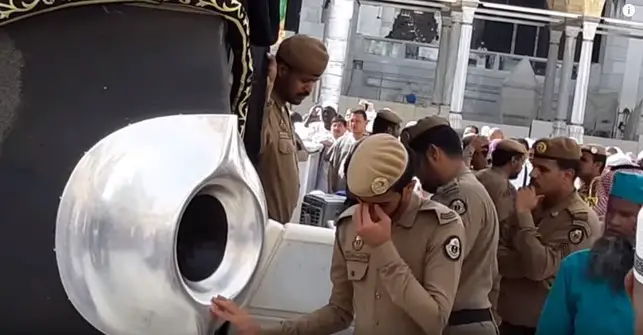
Was the Black Stone Stolen? Yes, in the year 930 by the Qaramatian, Abu Tahrir Al Jannabi. He placed it in a mosque in the East of Saudi Arabia called Masjid Al Dirar so as to redirect the Hajj. He failed and was reported to have been eaten by worms until he died a miserable death.
References:
- Wikipedia- The Black Stone

- Islam – Question and Answers

- Wikipedia- Abdullah Ibn Al-Abbas

- Wikipedia-Umar Ibn Al Khattab

- Arab News-Significance of the Black Stone

